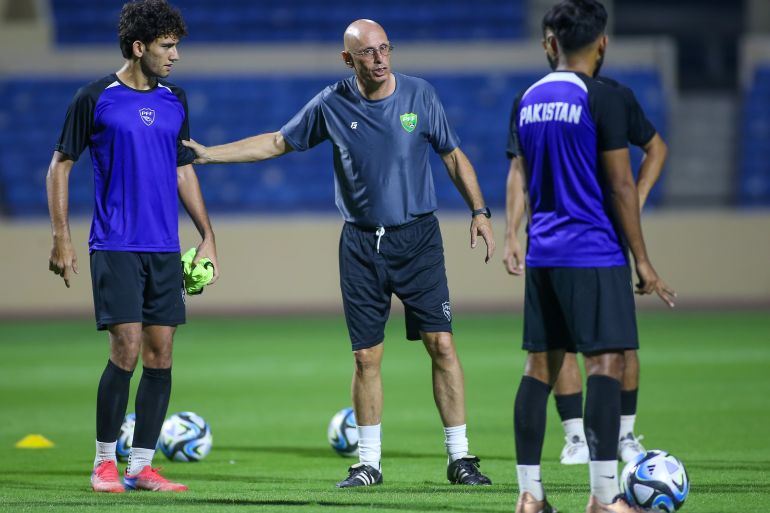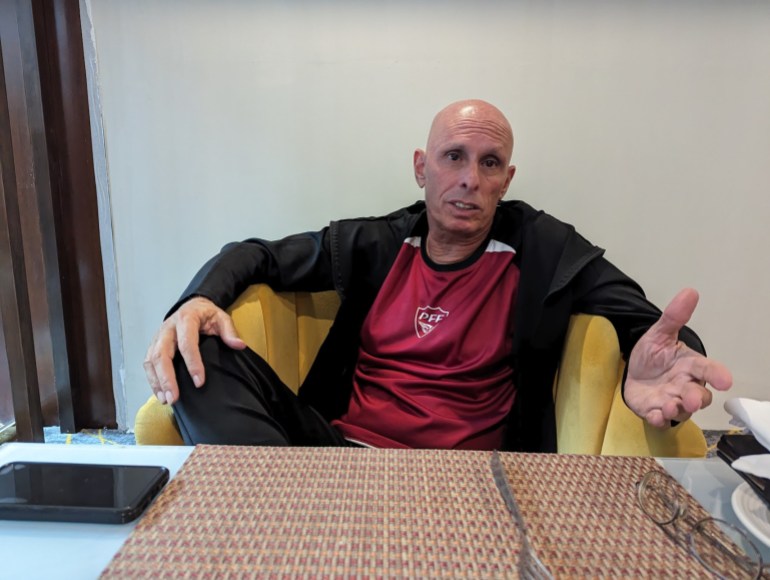‘We will fight’: Stephen Constantine on making history with Pakistan
The well-travelled English coach talks to Al Jazeera about taking on one of the toughest jobs in international football.

Islamabad, Pakistan – On the morning of October 17, Stephen Constantine, the head coach of the Pakistan men’s football team, discovered that the squad had bought him a cake for his 61st birthday.
Constantine, a strict disciplinarian, did not mince words: if the squad wanted to wish him a happy birthday, they should get him a victory over Cambodia in the second leg of their Asian first-round 2026 World Cup qualifier, to be played in Islamabad’s Jinnah Sports Stadium later that day.
Keep reading
list of 4 itemsA ‘very different’ Pakistan? National football team aim to end dire record
Pakistan football team to play in India for first time since 2014
From gang wars and drug lords to football fields
And he added: there should be no cake on his face.
“Well, they ended up making history. Got me the win and went on to smash two cakes in my face,” Constantine laughingly recalled to Al Jazeera in an exclusive interview.
The 1-0 victory was Pakistan’s first win in three decades of World Cup qualifiers; a monumental achievement for the team and Constantine himself, who had taken over as coach only days before their first leg in Cambodia.
Pakistan’s reward was a place in the second qualification round, in a group including Saudi Arabia, Tajikistan, and Jordan.
Pakistan’s opener is a trip to play Saudi Arabia in the eastern city of Al Hofuf on Thursday.
“I can only speak for myself, and for however long I am here, but the days of Pakistan rolling over for any opposition are gone,” the bald, bespectacled coach said with a steely resolve. “If you want to beat us, you will have to earn that. We are not going to lay down easily.”
Shaheens have landed in Saudi Arabia 🇸🇦#pakistanfootball #dilsayfootball #shaheens #weare26 pic.twitter.com/iKFsUNzmVY
— Pakistan Football Federation (@TheRealPFF) November 11, 2023
Before their World Cup qualifiers against Cambodia, Pakistan were on a 13-match losing streak dating back to 2018.
The Pakistan Football Federation (PFF) has been banned by FIFA, football’s world governing body, for political interference twice in the last six years. The country hasn’t had a functional football league for more than a year due to a lack of funds and infrastructure issues.
“For that first game, I had a group of players of whom half hadn’t been training at all due to lack of football league, and the other half of them didn’t remember the last time they played in a competitive game,” the London-born Englishman said.
Despite facing such adversity, Constantine’s charges were able to get a 0-0 draw in Phnom Penh.
“With a little bit of luck, could have even stolen it,” he said.

Constantine brings a wealth of experience and pedigree to the job.
Before joining Pakistan, he had coached the national sides of Nepal, Malawi, Sudan, Rwanda, and India (twice).
His most successful tenure was with India during his second stint, taking them from 173rd in FIFA’s world rankings in 2015 to 97th by the end of 2018.
The following year, India qualified for the Asia Cup for only the fourth time in their history, with the second youngest squad in the tournament.
“I was coaching India when we played Pakistan in September 2018, when we destroyed them 3-1, which should have been a lot more. From that squad, 14 boys eventually made it to the team which qualified for the Asian Cup. My focus has always been developing the youth team,” the coach said.
Constantine recognises the challenges faced by Pakistan, 193rd in FIFA’s rankings, in their match against Saudi Arabia, who last year shocked eventual winners Argentina 2-1 during their group stage match in the World Cup in Qatar.
The Green Falcons are currently ranked 57th in the world and are coached by legendary Italian manager Roberto Mancini.
Constantine urged Pakistan fans to keep their expectations in check.
“I am sure it is going to be an extremely difficult game. They will put us under pressure from the first minute. I have already heard some predictions of the potential scoreline. In games like these, you just need to avoid conceding early and see how it goes. I promise we will fight,” Constantine said in a matter-of-fact tone.
He also stressed that it’s a huge opportunity for Pakistan’s footballers to gain experience, and can help tap into the growing popularity of the game in Pakistan.
“One of the things I said to the boys before we played Cambodia in Islamabad, is that these are the games that you want to be part of. This game will literally decide the future of Pakistan’s football. Had we not won, I really don’t know what would happen going forward.”
For a country that had been starved of international football for a long time under the FIFA bans, the second round of qualifiers guarantees at least six matches.
After Saudi Arabia, Pakistan are set to play against Tajikistan in Islamabad on November 21, while the remaining qualification matches will be played next year in March and June. The top two qualify for the third round of qualifiers, in which 18 teams are split between three groups.
But considering the upheaval and uncertainty in Pakistan football, planning for the future is not for the faint-hearted.
In fact, Constantine’s contract ended after the win against Cambodia and has only been extended until March, as the FIFA-led Normalisation Committee of the PFF is expected to hold elections for the federation that month.
The Englishman was pragmatic about the uncertainties, saying that all he can do is put in the hard work, and try to get Pakistan back to “where it should be”.
He stressed that the country needs a functioning football league that allows players from different age groups to constantly compete and develop, and only that would unlock the country’s true potential.
“Look, I am a realist. We are not going to the World Cup. We are not ready for that. We could possibly lose all six of these games. But these six matches will shape how we are going to be as a team going forward, and I am here for that,” he said.
“I want to build for the future, not the past. I do not care how old you are. All I care about is: can you do what this team needs?”